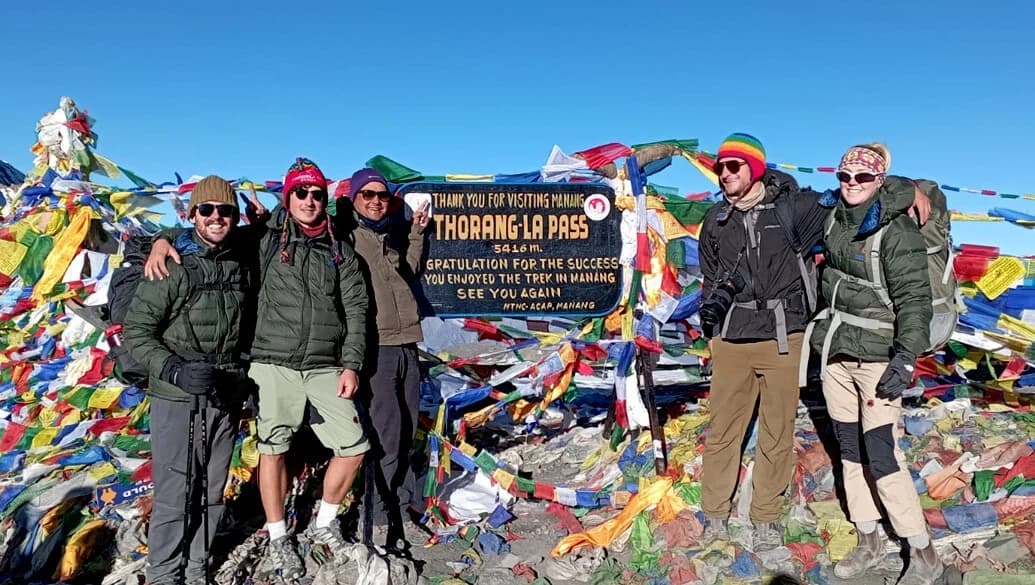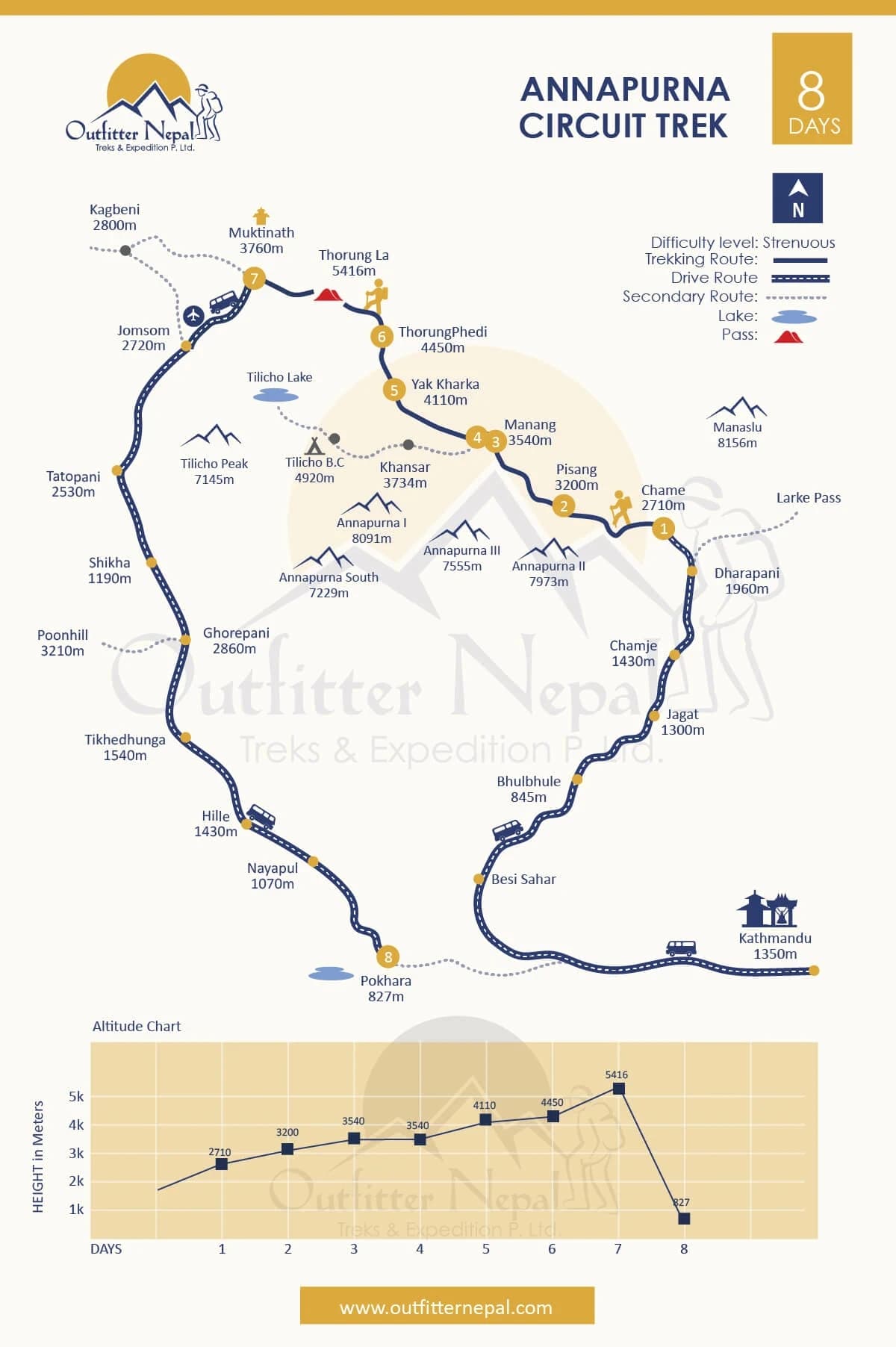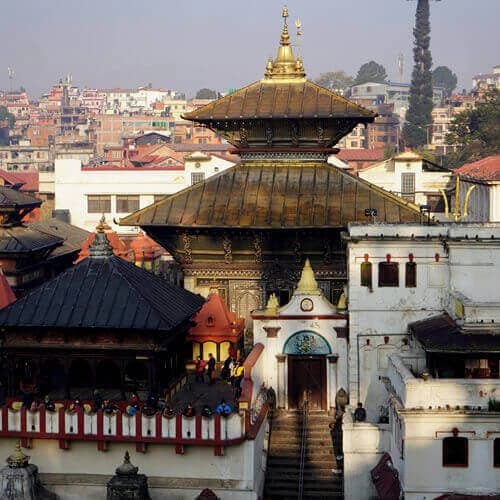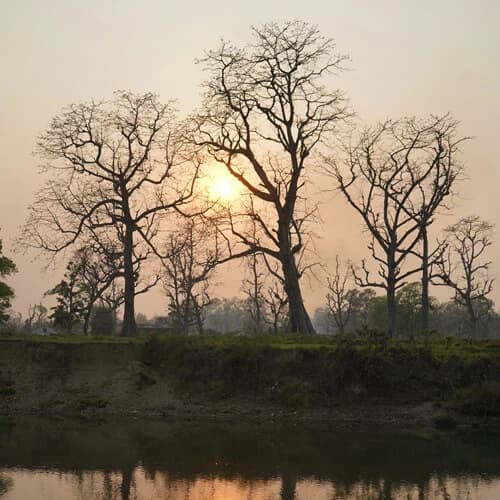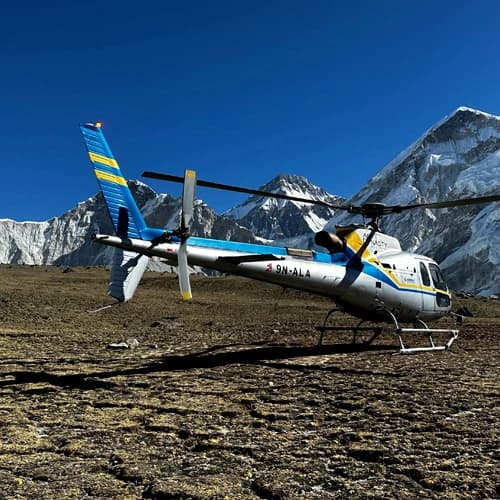8 Days Annapurna Circuit Trek Overview
The world-famous Annapurna Circuit Trek used to be one of the longest treks in Nepal, lasting up to 20 days, where the trekkers circumnavigate the entire Annapurna range on foot starting from Besisahar and ending in Pokhara. Trekking nowadays isn’t as lengthy and challenging as it used to be. With our 8 Days Annapurna Circuit Trekking package, you can take a bus and jeep ride from Kathmandu to Chame, start your hiking journey all the way from Chame, and end it in Muktinath before taking a bus to Pokhara. As the trek starts in Kathmandu and ends in Pokhara, it’s good for you if you’re already in Kathmandu and want to spend some time in Pokhara afterward.
The Annapurna region is endowed with wonderful vegetation and extraordinary natural beauty, which provides a home for rare species and flora. Additionally, you will enjoy the pleasant interactions with the harmonious coexistence of local residents from different ethnic backgrounds. You can learn about the lively Hindu and Buddhist cultures these people have upheld for a long time.
The Annapurna Circuit Trek 8 Days is one of the most satisfying high-altitude treks in Nepal. It is said that If you can only take one hike in your life, make it this one. You'll learn more on this trekking trip than you will on many others combined. The circuit trip traverses many climatic zones, displays an astounding variety in landscape, and, most significantly, interacts with a wide range of ethnic communities. It is regarded as the best long-distance trek in the world for a reason. When hiking over the Annapurna range, you'll come across dream-like alpine scenery that makes the Annapurna Circuit a worldwide goal for trekkers.
Our Outfitter Nepal professionals have put together everything you need to successfully accomplish the 8 days Circuit Trip in the Annapurna region. We arrange everything for you, including permits, food, lodging, and transportation, so you can trek without stress. Furthermore, your journey will be informative, safe, and fun, thanks to our qualified guides and skilled potters.
Let's now review the best features, itinerary plan, useful information, departure dates, package cost, and more about the 8-day Annapurna Circuit Short trek journey. Make sure you know everything before booking the trip. It's time to take a virtual trip around the Annapurna Circuit with us. If you have any questions, feel free to email or WhatsApp us.
Disclaimer: You will be driving a considerable distance on difficult off-roads in rural Nepal to complete the Annapurna Circuit in under 8 days. Due to the numerous hazards of landslides obstructing the roads, it is unsafe to travel on these roads during the monsoon. As a result, the trip is NOT planned for June, July, and August. Reservations for the Short Annapurna Circuit Trek 8 Days are accepted for the rest of the year (September to May).
Best features of the Bespoke Annapurna Circuit Trek 8 Days
- Experiencing the beautiful bus rides in the countryside of Nepal
- Walking through the valley of the Marshyangdi River
- Trekking in the rich vegetation of Annapurna Conservation Area
- Hiking in the isolated villages of Chame, Pisang, and Manang
- Admiring the alluring Gangapurna Glacier and Lake from Manang
- Crossing the difficult Thorong La Pass at 5416 meters
- Praying at the holy Muktinath Temple
- Watching the rich cultures and traditions of various ethnic groups
What makes the Short 8 Days Annapurna Circuit Trek a unique experience?
Due to its continually changing climatic zone, vegetation, and weather pattern, the Annapurna Circuit varies from other trekking journeys. The hiking excursion starts in a lush subtropical environment, where you pass a number of terraced farms and fields in the nice, warm weather. Trekkers witness many Himalayan villages constructed in the traditional style. Then, as you approach the Marsyangdi River Valley, you travel through colder deciduous trees. The majority of the woodlands you travel through are densely forested with subtropical plants, including birch, oak, juniper, and rhododendron.
Just after a couple of days, the Annapurna Range, which features the tenth-highest peak in the globe and the highest mountain in the region, Annapurna I (8,091 m), will become visible. You will come across bleak ravines and dry hills encircled by snow-capped summits once you have ascended above the tree line. In a region of the Himalayas that resembles a desert, the Manangis (people of Manang) live in a sparsely populated area where there is frequently a ferocious wind. The highest point of the Annapurna Trek lies in the mountain pass known as Thorong La (5416 m), where the Khatung Kang and Yakawa Kang mountains converge.
The stunning, arid-like Himalayan hills with their peculiar purplish color become visible from Thorung La Pass. Most of the remaining route is a descent. Before arriving in Pokhara's gorgeous Valley of Lakes, you will descend the alpine environment and travel through an abundance of subtropical vegetation once more. The diversity in the landscape within a limited time frame, unmatched natural beauty, and rich cultural heritage set the 8-Day Annapurna Circuit Trek apart from others.
Is the Short 8 Days Annapurna Circuit Trek right for me?
Let's be real! The Bespoke Annapurna Circuit Trek 8 Days is not for slow travelers who wish to take their time to leisurely explore the locations and fully comprehend the local culture. This shorter version of the 20-day Annapurna Circuit Trek is intended for hikers with limited vacation time who nonetheless want to experience the exhilaration of circumnavigating the Annapurna range on foot. So, if you need to do the Annapurna Circuit quickly and are short on time, this trip is for you.
Completing a longer trek in a short time also calls for health complications. Thus, you must have great physical fitness and mental endurance to successfully overcome the challenges that you may face during the trek. Remember, you will be hiking through the rugged landscape of the remote Himalayas and traversing high-altitude mountain passes (Thorong La at 5416 meters) in a short period of time. The 8 Days Annapurna Circuit Trek is only appropriate for you if you're physically and emotionally prepared to handle the challenging terrain, high altitude, and unpredictable weather of the Annapurna region.
What to anticipate from the Bespoke Annapurna Circuit Trek 8 Days?
The Annapurna circuit hike is regarded as more than just a trek for a number of reasons. The diversity of the civilizations in places that are breathtakingly beautiful from beginning to end is admirable. The entire journey through the Himalayas is an adventure that allows you to see some of the most beautiful mountains on the planet and gain an understanding of and appreciation for the fascinating culture and distinctive way of life of the mountain people.
The Bespoke Annapurna Circuit Trek of 8 Days takes you through the Thorong La route, the highest trekking pass in Nepal. Likewise, you get to spend the night in Manang and Muktinath, the two most beautiful towns in the Annapurna Region, which is a wonderful opportunity to meet the locals. Every day, we hike over the most isolated part of the nation. Expect to explore the stunning Himalayas and discover what it's like to live in a small, rural village.
The bus ride from Kathmandu to Chame marks the start of the 8 Days Annapurna Circuit Trekking. The Marsyangdi and Kali Gandaki rivers' valleys are the two primary riverbeds that the trail follows. Prior to reaching Thorong Phedi, the trail travels primarily along the Marsyangdi River Valley. You continue your journey by traveling through the Kali Gandaki River Valley after traversing the difficult Thorong La Pass.
Major Attractions of the 8 Days Tailor-Made Annapurna Circuit Trek
Thorong La Pass (5416 m)
The Thorong La Pass, the trek's highest point, located between the Khatung Kang and Yakwa peaks, is one of the trek's highlights. The journey to the peak of the pass is thought to be the most difficult in the region as you have to climb a rough, steep trail. Once you've attained the summit and have a chance to take in the beautiful view of the surrounding mountains, you'll feel as though your hard work and perseverance have been justly rewarded. The sense of success you get after admiring the stunning view from the pass cannot be expressed in words.
The holy Muktinath Temple
One of the most sacred Hindu pilgrimage sites, Muktinath Temple, is located at the base of Thorong La Pass. This highest temple in the world (3,800 m) is also known as Mukti Kshetra (place of freedom). According to legend, you can atone for all of your sins and find good fortune at the Muktinath Temple. Thousands of pilgrims travel to the temple from all across India and Nepal to take a bath in the adjoining holy pond and taps to wash away their sins. During the trip, you get the opportunity to visit the temple and ask for blessings.
Manang, the stunning Himalayan Village
Manang is renowned for its grandeur and majesty. Trekkers frequently stay a few days in this little village tucked away by the Marsyangdi River to enjoy the beautiful scenery and blissful sound of the river flowing. For your day of acclimatization, Manang offers a choice of activities, including exhilarating mountain biking and quick hikes to adjacent scenic villages. You can also visit the ancient sites of Milarepa's Cave and Braga Bhojo Gompa when you have free time. Manang itself is a great place to spend the day.
Annapurna range and the neighboring mountains
Without a doubt, the 8-day Annapurna Circuit journey will allow you to see the mountains of the Annapurna range. There are numerous peaks inside this 55-kilometer-long massif, including Tilicho Peak (7135 m), Annapurna (8091 m), Machhapuchhre (6993 m), Gangapurna (7455 m), Nilgiri Himal (7061 m), and others. Also visible in the distance are Dhaulagiri (8167 m), Mt. Manaslu (8163 m), Mt. Lamjung Himal (6986 m), and other peaks. Mountains blanketed with snow will actually surround you on all sides.
Culturally rich villages
In addition to offering a breathtaking view of the tallest mountain peaks, the trek offers an intriguing glimpse into the cultures, traditions, and rituals of the area. You will have the chance to experience the true cultures of the Gurungs, Brahmins, Manangis, Thakalis, and Magars throughout your excursion. You will have the chance to learn about the habits, values, and long-standing traditions of the area from the friendly inhabitants.
